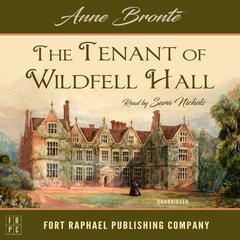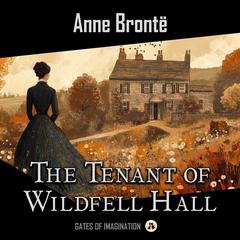 Play Audiobook Sample
Play Audiobook Sample
The Tenant of Wildfell Hall Audiobook
 Play Audiobook Sample
Play Audiobook Sample
Quick Stats About this Audiobook
Total Audiobook Chapters:
Longest Chapter Length:
Shortest Chapter Length:
Average Chapter Length:
Audiobooks by this Author:
Publisher Description
"The Tenant of Wildfell Hall" by Anne Bronte is a gripping and thought-provoking novel that delves into the themes of love, redemption, and the struggle for personal freedom in 19th-century England. Set in a society bound by strict social norms, the story follows the journey of Helen Graham, a mysterious young woman who takes up residence at the secluded Wildfell Hall. "The Tenant of Wildfell Hall" offers a searing critique of the oppressive gender roles and double standards that pervaded Victorian society. Through Helen's story, the novel explores themes of women's agency, the destructive power of addiction, and the importance of personal accountability. Anne Bronte's uncompromising portrayal of the consequences of toxic relationships serves as a powerful social commentary and a call for change. With its richly developed characters, evocative descriptions of the English countryside, and compelling exploration of moral dilemmas, "The Tenant of Wildfell Hall" is a timeless novel that examines the complexities of human nature and the transformative power of love and redemption. It is a story that resonates with readers, reminding us of the enduring struggle for personal freedom and the courage required to challenge societal norms in pursuit of a better life.
Download and start listening now!
The Tenant of Wildfell Hall Listener Reviews
Be the first to write a review about this audiobook!
About Anne Brontë
Anne Brontë (1820–1849) was born in Yorkshire, the youngest of six children. Her mother died within a year of her birth, and her two eldest siblings died four years later. The Brontë children were raised in an isolated Yorkshire parsonage, where they thrived in fantasy worlds that drew on their voracious reading of Byron, Scott, Shakespeare, and Gothic fiction. Anne’s first novel, Agnes Grey, was published in a volume together with Emily’s Wuthering Heights in 1847. The Tenant of Wildfell Hall reflects her brother Branwell’s gradual descent into alcoholism, drug addiction, and madness. Both Branwell and Emily died of tuberculosis in 1848; Anne succumbed to the same illness in 1849.




















